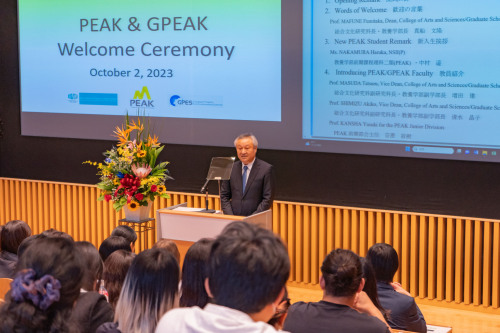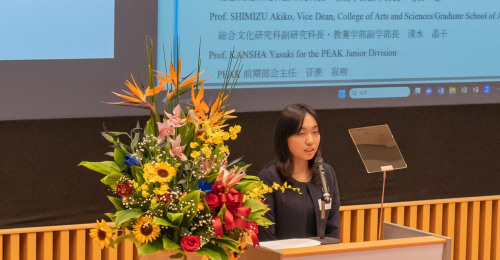- Address by the Dean at the 2023 PEAK & GPEAK Welcome Ceremony
 October 2, 2023
October 2, 2023

Words of Welcome for
PEAK & GPEAK Welcome Ceremony
October 2, 2023
On the Komaba campus
Fumitaka Mafune
It is with great pleasure that I warmly congratulate you upon your entrance into the University of Tokyo. You are now on the Komaba campus, and you have just enrolled in the College and the Graduate School of Arts and Sciences.
First, I would like to mention the countermeasures against COVID-19 at the University. I know that all of you have spent the past precious three years of your lives in a situation where your free activities were completely restricted due to the pandemic. Classes at the Komaba campus were conducted entirely online for the summer semester of 2020, and regular exams were also offered online. The following year, in 2021, in response to rapid progress in vaccine development along with medical research on novel coronavirus infections, our College and Graduate School changed to a format in which some classes were face-to-face and the remaining classes were essentially online. Since May 8 of this year, COVID 19 has been moved from category 2 equivalent to category 5, the same as seasonal influenza.
Under such difficult conditions, our College and Graduate School continued to strive to keep our research and education active and to ensure that our students' lives on campus remained safe and secure. Moreover, although we are returning to pre-pandemic conditions, we also believe that we must design and be ready to implement a new educational model for the post-COVID era. I hope that each of you will make positive contributions to the development of this new model and show us ways to realize it so that we may build our future campus together.
Our organization embodies the academic policy of UTokyo's liberal arts education, mainly in the Junior Division of the College but also in the Senior Division in the College and Graduate School. We offer an interdisciplinary education and perform cross-disciplinary research that encompasses the natural sciences, social sciences, arts, and humanities. As the Dean of the College and the Graduate School of Arts and Sciences, I hope you will make the most of your academic environment, not only to deepen your knowledge in a specific field of study or research, but also to broaden your interests, experiences and perspectives for your future life and for society.
The questions we face in life are not ones that have a unique, correct answer. Furthermore, in our current society, where the direction of the future is hard to predict, the issues themselves become even more complicated. For example, for COVID-19, there were two counter opinions: "We must ensure the health, safety, and security of people by securing the medical system even if we have to completely stop social activities through a lockdown," and "We must not stop economic activities”. Both are correct depending on one's position, and one or the other is not the only correct solution. This is evident from the fact that countries around the world have responded in different ways depending on their circumstances and ways of thinking. In the end, the correct solution will be verified in the future when we look back at the past.
As an example of a global environmental issue, let’s consider global warming. Intensive and extensive research has shown that greenhouse gases such as carbon dioxide undoubtedly cause global warming. Automobiles with engines use gasoline as an energy source, which is composed mainly of octane, a hydrocarbon. For octane to burn completely and form water and carbon dioxide, theoretically 14.7 g of air is needed for every 1 g of gasoline. If automobile users are pursuing the best fuel economy, it is surely better to use more than this amount of air. However, in practice, this is not the case with actual automobiles, as excessive air forms high levels of nitrogen oxides, which can also cause biological damage directly or indirectly. In other words, in addition to the economic rationale, there are many essential elements to consider, and the balance among them is currently being determined by politics. All of this is to say that obtaining a better solution to a complicated issue requires an accurate understanding of the complicating elements. I hope that UTokyo's liberal arts education will help you approach these complicated issues.
Thank you for your attention. Congratulations again on your entrance into the University of Tokyo.

